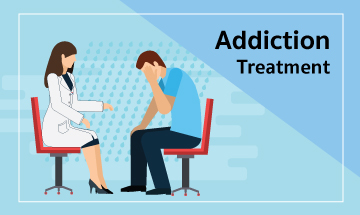Addictive disorders are a bunch of disorders which will cause physical and psychological damage. Receiving alcohol treatment in Madurai is important for breaking the cycle of addiction.
First steps
The first step to recovery is acknowledging the presence of addiction and its effects on existence.
The first step towards recovery is acknowledging that substance use has become an issue within the person’s life which is disrupting the standard of their life. this may result from impairment in class, work, social, recreational or other important areas of function.
Once a personal recognizes the negative impact of a substance on their life, a good range of treatment options is on the market.
A person with an addictive disorder requires access to treatment. for many people, treatment may last for the remainder of their life. they’re going to have to abstain from the substance on a life-long basis, which might be difficult. Treatment plans for addictive disorders will often change to satisfy the wants of the patient.
Several treatment options are available at Akrura hospital, and the majority experiencing addiction will receive a mix of approaches. None of the treatments for addictive disorders works for each person.
Common interventions at Akrura deaddiction centre might involve a mixture of inpatient and outpatient programs, psychological counselling, self-help groups, and drugs.
Detoxification
Detoxification is often the primary step in treatment. This involves clearing a substance from the body and limiting withdrawal reactions.
Online therapy can help with long-term addiction support
Find a therapist from BetterHelp’s network of pros for your addiction recovery journey. Take a quiz, get matched, and begin getting support via phone or video sessions.
Counselling and behavioural therapies
Therapy can be one-to-one or a gaggle session.
This is the foremost common variety of treatment following detoxification.
Therapy might occur on a one-to-one, group, or family basis looking on the wants of the individual. it’s usually intensive at the outset of treatment with the amount of sessions gradually reducing over time as symptoms improve.
Different types of therapy include:
cognitive-behavioural therapy, which helps people recognize and alter ways of thinking that have associations with substance use.
multi-dimensional group therapy, designed to assist improve family function around a young person or teen with a substance-related disorder
motivational interviewing, which maximizes an individuals willingness to vary and make adjustments to behaviours
motivational incentives that encourage abstinence through positive reinforcement
Counselling for addiction aims to assist people change behaviours and attitudes around employing a substance, furthermore as strengthen life skills and support other treatments.
Rehabilitation programs
Longer-term treatment programs for substance-related and addictive disorders may be highly effective and typically concentrate on remaining drug-free and resuming function within social, professional, and family responsibilities.
Fully licensed residential facilities are available to structure a 24-hour care program, provide a secure housing environment, and provide any necessary medical interventions or assistance.
A few styles of facilities can provide a therapeutic environment, including:
Short-term residential treatment: This focuses on detoxification and preparing a private for a extended period within a therapeutic community through intensive counselling.
Therapeutic communities: someone seeking long-term treatment for severe kinds of addictive disorder would board a residence for between 6 and 12 months with on-site staff et al. in recovery. The community and staff function key factors in recovery from and changes in attitudes and behaviours toward drug use.
Recovery housing: This provides a supervised, short-term stay in housing to assist people engage with responsibilities and adapt to a replacement, independent life without ongoing substance use. Recovery housing includes advice on handling finances and finding work, also as providing the connection between someone during the ultimate stages of recovery and community support services.
Self-help groups
Group therapy and long-term rehabilitation can help someone with a substance use disorder feel less isolated.
These may help the recovering individual meet others with the identical addictive disorder which regularly boosts motivation and reduces feelings of isolation. they’ll also function a useful source of education, community, and knowledge.
Medications
A person might take medication on never-ending basis when recovering from a substance-related disorder and its related complications.
However, people most typically use medications during detoxification to manage withdrawal symptoms. The medication will vary counting on the substance that the person is hooked in to.
Longer-term use of medicines helps to cut back cravings and forestall relapse, or a return to using the substance after having recovered from addiction.
Medication isn’t a standalone treatment for addiction and will accompany other management methods like psychotherapy.
Takeaway
Substance-related disorders are chronic, complex diseases that need prolonged, intensive treatment. the kind of substance involved and therefore the severity of the addiction will dictate the course of treatment
Treatment often begins with detoxification, using medicine to scale back withdrawal symptoms while a substance leaves the system.
Certain medications also can serve to manage prolonged withdrawal symptoms and support sobriety in some people.
A meeting with a professional at Akrura alcohol treatment hospital in Madurai & rehabilitation center will usually include an interview and an evaluation to see the symptoms. To determine the kind and severity of the mental disturbance. In certain cases, an intervention is also required from family and friends. If you or someone you know needs help, call Akrura to induce more information on treatment.
